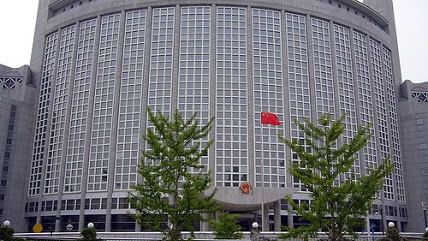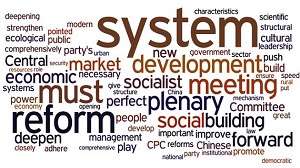China's Third Plenum Report Vague, But States Markets Should Play "Decisive Role" in Economy
3,800 word document after a four day meeting


Members of the Chinese Communist party met this weekend for the Third Plenum, a session where the party broadly sets its economic and political agenda for the coming years. This one was the first held since Xi Jinping took office as president, and so has been highly anticipated by China watchers. As usual for political statements in the Communist country, the plenum's report was vague. The Global Post suggested:
Even under ordinary circumstances, interpreting Chinese politics is notoriously difficult. The system is opaque and convoluted, with ritualized language, cookie-cutter leaders and lots of befuddling slogans — see "The Three Represents."
But the communiqué released Tuesday evening after a four-day conclave of top Communist Party officials may be a high-water mark of mind-numbing vagueness.
The Post went on to dismiss the report as a "Rorschach test" (more about the word cloud from the BBC, pictured, here) and interpreting it to an exercise in cloud watching. However, as CNBC notes, third plenums are often followed by major reforms. And so there could be,maybe, some good news for free markets as the document calls for a "decisive role" for markets in China's economy as a centerpiece of the (centrally) planned reforms. The South China Morning Post explains:
For the first time, the party also said the private sector should be treated on the same footing as state-owned enterprises. It said: "Both the public and private sectors are the same important components of a socialist market economy and the important bases of our nation's economic and social development."
The party decided to set up a powerful organ to steer the reform crusade. "The central leading group on comprehensively deepening reforms will be responsible for the overall reform design … and the implementation of reform policies," it said.
On other fronts, the party vowed to "promote the rule of law and respect for the constitution", which will be crucial for a market-oriented economic system to flourish.
The only actual result of the plenary session so far has been the establishment of two new committees, one to direct economic reforms, the other national security strategy, in case anyone thought to question the party's dedication to central planning and the politics of committees.
Previously: Hayekians in China
Editor's Note: As of February 29, 2024, commenting privileges on reason.com posts are limited to Reason Plus subscribers. Past commenters are grandfathered in for a temporary period. Subscribe here to preserve your ability to comment. Your Reason Plus subscription also gives you an ad-free version of reason.com, along with full access to the digital edition and archives of Reason magazine. We request that comments be civil and on-topic. We do not moderate or assume any responsibility for comments, which are owned by the readers who post them. Comments do not represent the views of reason.com or Reason Foundation. We reserve the right to delete any comment and ban commenters for any reason at any time. Comments may only be edited within 5 minutes of posting. Report abuses.
Please to post comments


Get ready for a great leap forward.
The official statement could easily be something Congress would agree to, if you could get enough of them to swallow hard and say that the private sector is equally as important as the public sector.
Bottom line: however vague it is, the official statement by the ChiComs may be more libertarian than anything our current Congress would likely vote for.
It's like they(the communist party that is) are edging ever so slowly rightward and we (the land of the free) are edging more rapidly leftward.
Maybe the Chinese will even discover that big centralized planning is incompatible with a successful market economy. Who knows, these are strange times.
It's like they(the communist party that is) are edging ever so slowly rightward and we (the land of the free) are edging more rapidly leftward.
Sheldon Richman has a sad.
It would be beautiful if, by the time the original Hong Kong quasi-independence deal expires in 2047, China has adopted Hong Kong's policies.
Libertopia of the east! WTF, I love Chinese food.
Yeah - that'd be pretty much the opposite of what most people figured would happen! And would be way cooler.
I read "plenum" and I think "internal combustion engine intake manifold" (shorter: EDELBROCK!).
Fucking Chinese...
Sounds like some serious business to me dude.
http://www.Privacy-Web.tk
Sorry, but what speaks volumes with Asians (my wife is Chinese) is not only what they say but what they don't mention, in this case any mention of reform of State-owned enterprises.
And when you do look at what they say you really need to read between the lines. Unfortunately, westerners struggle to do this very well:
"As anticipated, the six-page document was vaguely worded and replete with boilerplate language about the leading role of the party and socialism with Chinese characteristics. There was no reference to reform of state-owned enterprises and no explicit discussion of financial liberalization.
So is this good news? Or just a big letdown? Both optimists and pessimists seem to think the ambiguous document confirms their views."
When I read some of the text it sounds like these "historic" reforms will only touch the margins and still allow the State to maintain just as much control over private economic activity.